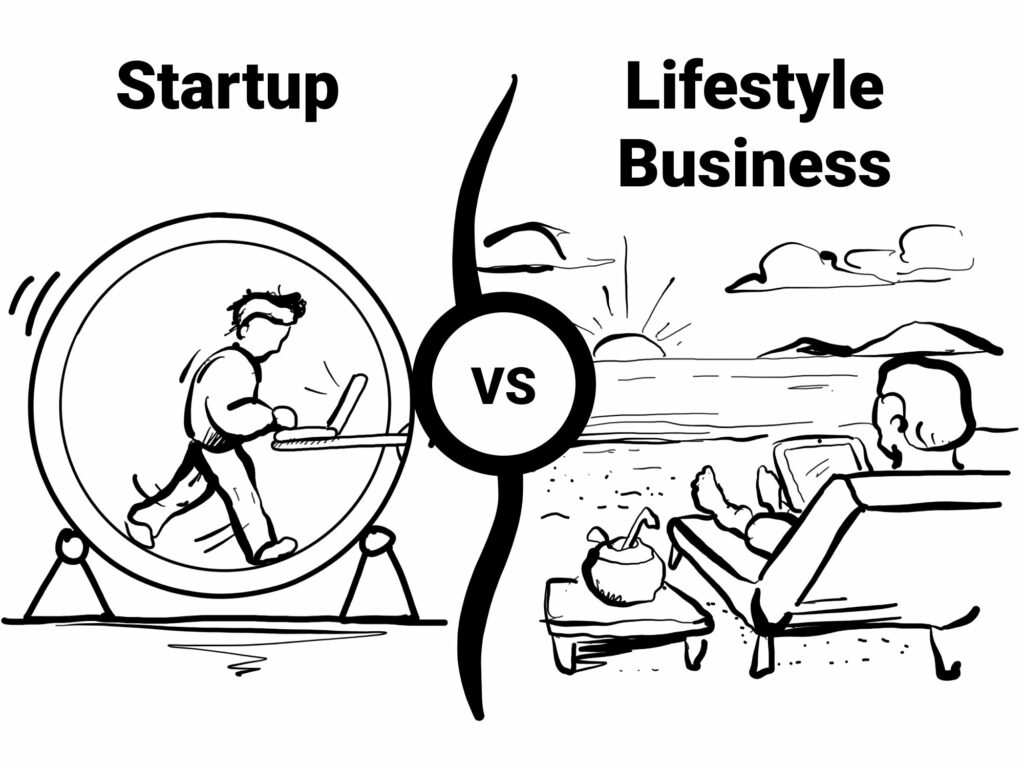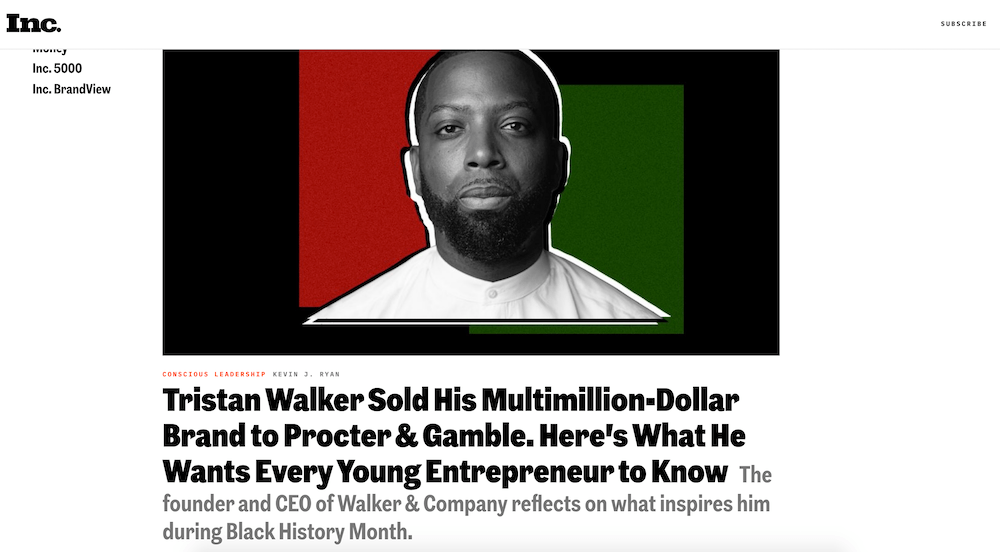Startup vs Lifestyle Business – Which One Is Healthier For You?
One of the most desired achievements for young people nowadays is to build their own Startup. Silicon Valley has managed to create a tremendous following in recent years. But is a Startup for everyone? In this article, I want to show you why the Startup world creates endless shiny object syndromes with empty promises and why it may be smarter to build a lifestyle business.

At the start of my career, I was frantically obsessed about building Startups.
Throughout my studies in architecture, I always felt drawn towards the technology sector and building disruptive digital services.
Back in the days when the tech industry was moving so fast with new smartphone slapping you left and right every week, I couldn’t help but get drawn into the tech world.
Silicon Valley pushed the shiny object syndrome that brainwashed so many young people into believing that the only way to make an impact is to build a technology company and eventually going IPO.
It wasn’t really a surprise that I started my career working in a tech consultancy after finishing my degree in architecture.
Over the years, as my work experience grew, my understanding for business expanded and also my view on life changed, I quickly came to the realization that the Startup world is not for me.
In this article, I want to give you 3 reasons why entering the Startup world can lead to unhappiness and building a Lifestyle Business maybe a better choice in the long run.
1. The Hope for Fame and Fortune
Let’s be honest, the biggest reason that captivates most people are the big dollar signs 💰💰💰
You can’t help but imagine your name mentioned on Forbes in the same sentence as “… just raised $1Million “.
There is a nice sound to it.
Quickly, the imagination goes wild and you see yourself throwing money around like there is no tomorrow and buying fancy mansions with 20 parking lots.

I’m not gonna lie. I used to consume all these business blogs with catchy titles like this every day…

My motivation to build a company was purely based on making money and making a name for myself.
To the outside world, I wanted to make an impact and portraying an image of being the savior of humanity.
But deep inside, it was ego driven.
Chasing big money is a quick way to end … nowhere.
To make a real impact, you need to be genuinely driven to improve people’s life. And not to chase one funding round after the other.
Let’s look at the UBERs and WeWorks in the world.
These companies have a valuation of billions but still struggle to make a profit. How can a company with so much money lose money on a daily basis?
Yes, funding may be an important part for a company to scale, but if your business solely survives on outside money then the foundation is wobbly.
The biggest problem I see with most startups is: they have a ton of money, but they have no profitability.
If your business only loses money then you don’t have a business. You have a problem.
But not only money is an illusion but also freedom which brings me to my next point:
2. The Illusion of Freedom
The other big bait that lures people into the fast-paced Startup world is the illusion of freedom.
Many think they can escape working for someone else by building their own company and get people invest in their idea.
Quickly do they realize that they just created another job for themselves. Something that they tried to escape in the first place.

If your business does not generate money from day 1 and purely relies on outside money, you will never be free.
People never give you money for no reason. As soon as you have investors stepping in, you give up control and quickly find yourself reporting to just another person.
3. Always Chasing More
The last big problem that I have with the startup world is the constant chase for the “next big thing”.
It is a never ending battle with discontent and it creates a constant chase for more.
Ultimately, it is just another illusion when people believe they can do whatever they want, lean back with a CEO title and millions in funding.
Having these two boxes checked, they believe happiness will kick in because they achieved everything they wanted.
It is a dangerous situation to rest on.
In the Startup world, companies are constantly worrying about competition and looking for new opportunities to “dominate” the market before everyone else. Moving at a high speed, scaling up fast and inventing new markets is not for the lighthearted.

There is nothing wrong with being innovative and pushing boundaries but you don’t need to reinvent the wheel all the time.
There is nothing wrong about slowing down and focus on the things you are good at.
Happiness is not about reaching a future destination, but rather a state of appreciating what where we are right now.
After reading this, you may think I hate startups.
This couldn’t be further from the truth, because there are a ton of great companies doing amazing work. Not all business ideas can be bootstrapped without any money. Especially if you need the right skills and have to build a team to turn your idea into reality.
I’m just against the over glorifying image of success that the media is portraying that doesn’t paint the entire picture.
Creating the illusion that only the ones that hustle the hardest and longest will become successful doesn’t help the young generation to make good decisions for their future career and contribute value to the world.
Instead, I would love to give you an alternative business model that is by far more sustainable and gives the opportunity to make an impact while keeping your sanity.
If you are really interested in building a business and sharpening your entrepreneurial skills, then a Lifestyle Business may be a good option.
What is a Lifestyle Business?
“A Lifestyle Business is a business that was set up with the focus to generate and sustain a certain level of passive income that allows its founders to enjoy a particular lifestyle.”
By definition, a Lifestyle Business generates enough money so you can enjoy the life you want without sacrifices. But the definition doesn’t have to end here because it doesn’t mean that a lifestyle business is limited to a certain income Level.
In fact, Lifestyle Businesses can generate $ Millions in revenue without the need for a complex company structure with thousands of employees.
How Does a Lifestyle Business Look Like?
The most common characteristics for a Lifestyle Business are:
- Your personal freedom is key
- Your income is not tied to your time – time is not exchanged for money like with freelancing
- It can be a scalable business model that doesn’t require complex business operations
- It is location independent so you can work from anywhere
- Lifestyle businesses can generate passive income 24/7
Based on these characteristics, most Lifestyle Business can be considered as online businesses.
This could be an e-Commerce store or even a SAAS company.
The biggest difference to a Startup is that Lifestyle Businesses start small. They are focused on getting customers and generating revenue as early as possible without the need for outside funding.
Many Lifestyle Business can start as a small side hustle and grow to a substantial size over years which then allows founders to move away from their full time job.
A Lifestyle Business is usually in for the long game with focus on slow and stable growth in an existing market compared to Startups which tend to attack new markets and scale big fast.
Which is Better – Startup or Lifestyle Business?
Ultimately, the question is not which one is the better business model and whether you should build a Startup or Lifestyle Business.
It is rather the question: What do you want from life?
If you have a personal drive to build a tech company to disrupt the world that plays in the UBER or AIRBNB category, then you shouldn’t get discouraged by this article.
But if you want to live life on your own terms, see the world and are OK with not changing the world, then a Lifestyle Business is the better, more healthy choice.
Both roads will lead somewhere.
The most important question to ask yourself is really:
What kind of personal story do you want to tell at the end of your lifetime?
